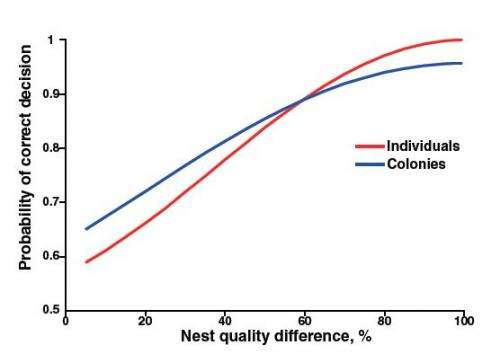August 1, 2013 report
Field study shows group decision making not always the best

(Phys.org) —A combined team of researchers from Arizona State University and Uppsala University in Sweden has found that collective decision making by ants doesn't always result in selecting the best option for adopting a new nest. In their paper published in Proceedings of the National Academy of Sciences, the team describes experiments they conducted with ants and artificially lit nests to determine how the ants chose the best option.
Temnothorax rugatulus, a type of ant that lives in Arizona, builds its nest in the ground—it has to pick a spot first however, and they way an ant colony does so was the focus of this new effort. The team wanted to know if collective decision making was always superior to that of individual ants.
To find out, the researchers set up an environment where a colony of ants found itself in need of a new nest. Each test run involved a colony that had to choose between a control nest and one that varied in quality. Quality was based on how much light could enter the nest from holes that led to the surface. The more light, the lower the quality—ants like it dark and fewer holes mean less heat loss.
The team noted that when one of the nests was obviously far superior to the other, both the colony as a whole, and individual ants more often chose the better option. What was surprising, however, was that individuals had a slightly better hit rate then the colony as a whole.
When a colony "decides" it needs a new nest, scout ants are sent out to find a new site. When one of the scout ants finds one it likes, it releases a chemical that attracts another of the colony members. If that member also likes the site it too will release a chemical attracting another ant and so on. The site that gets the most "votes" is the one eventually chosen by the colony. But, when a single ant is forced (by the researchers) to make a decision about which site to pick, it has to look at all the options and make a decision on its own—that takes more time than the multiple ant approach because in that scenario, individual ants only ever review one site—its more efficient. It's also more likely to lead to errors of course and that's why the colony as a whole tended to choose the wrong best site more often than the single ants—when the choice was obvious—who could make the decision without having to waste time thinking it over.
More information: Ant colonies outperform individuals when a sensory discrimination task is difficult but not when it is easy, PNAS, Published online before print July 29, 2013, doi: 10.1073/pnas.1304917110
Abstract
"Collective intelligence" and "wisdom of crowds" refer to situations in which groups achieve more accurate perception and better decisions than solitary agents. Whether groups outperform individuals should depend on the kind of task and its difficulty, but the nature of this relationship remains unknown. Here we show that colonies of Temnothorax ants outperform individuals for a difficult perception task but that individuals do better than groups when the task is easy. Subjects were required to choose the better of two nest sites as the quality difference was varied. For small differences, colonies were more likely than isolated ants to choose the better site, but this relationship was reversed for large differences. We explain these results using a mathematical model, which shows that positive feedback between group members effectively integrates information and sharpens the discrimination of fine differences. When the task is easier the same positive feedback can lock the colony into a suboptimal choice. These results suggest the conditions under which crowds do or do not become wise.
Journal information: Proceedings of the National Academy of Sciences
© 2013 Phys.org




















